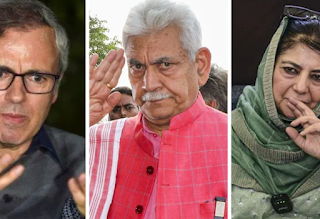As the Jammu and Kashmir Assembly election results are set to be announced, with exit polls predicting a hung Assembly, the spotlight is now firmly on Lieutenant Governor Manoj Sinha’s power to nominate five members to the Assembly. This has sparked significant debate among political parties, legal experts, and the public alike. The outcome of this nomination process could have far-reaching consequences in determining the balance of power in a House where every seat counts. The National Conference-Congress alliance appears to have an edge, but the introduction of these five nominated members could be a game-changer in what is already a highly fractured political environment.
The political intrigue surrounding the nomination process is closely tied to the 2023 amendments to the Jammu and Kashmir Reorganisation Act. Under these new provisions, the Lieutenant Governor has the authority to nominate members to the Assembly, including representatives of Kashmiri migrants and displaced persons from Pakistan-occupied Kashmir (POK). This amendment has raised the total number of Assembly members from 90 to 95, thereby increasing the majority threshold for government formation from 45 to 48 seats. For a hung Assembly, even a small shift in numbers could determine which party or coalition manages to secure the necessary majority to form the government.
The legal landscape surrounding the Lieutenant Governor's nomination powers has added to the political uncertainty. While the Jammu and Kashmir Reorganisation Act explicitly grants the Lieutenant Governor the authority to nominate members, opinions diverge on the extent of this power. Former Jammu and Kashmir Law Secretary Mohammad Ashraf Mir argues that the power lies within the Governor's discretion, as the issue of nominations falls outside the purview of the elected Assembly. However, legal expert Shariq Riyaz disagrees, suggesting that the Lieutenant Governor cannot make such nominations without acting on the "aid and advice" of the Council of Ministers, a situation that would only come into play once an elected government is in place. Riyaz emphasized that any deviation from this constitutional principle could be subject to legal challenges, hinting at the possibility of court interventions if the nominations are seen as politically motivated.
This debate on the Lieutenant Governor’s powers has also brought into focus the voting rights of these nominated members. In the past, similar situations have played out in Puducherry, where three nominated members to the Legislative Assembly were granted full voting rights, including the ability to participate in critical votes like trust votes and no-confidence motions. The 2018 Supreme Court ruling upheld that nominated members in Puducherry are legally indistinguishable from elected MLAs, granting them equal rights under the 1963 Union Territories Act. This precedent may have significant implications for Jammu and Kashmir, although the specific legal context could differ, especially given Jammu and Kashmir’s unique status as a former state reorganized into a Union Territory.
The reactions from political parties to the Lieutenant Governor's nominations have been strong and varied. The BJP, which supports the current legal framework, has defended the nomination process, asserting that it is grounded in the Jammu and Kashmir Reorganisation Act and the Constitution. BJP spokesperson Sunil Sethi has been vocal in dismissing the criticisms from opposition parties, arguing that those who object to the nominations are either misinformed about the law or acting out of political opportunism. Sethi’s comments reflect the BJP’s belief that the nominations are not only legal but necessary to ensure fair representation in the Assembly.
However, opposition parties like Congress and the National Conference have voiced serious concerns over the impact these nominations could have on the democratic process. Congress General Secretary Ghulam Ahmed Mir has argued that nominating members with political affiliations risks undermining the Assembly’s legitimacy. He has called for an apolitical approach to nominations, suggesting that experts, scholars, or social workers without political ties should be considered instead of individuals who might favor one political party over another. National Conference leader Rattan Lal Gupta has echoed these concerns, calling the move “unconstitutional and undemocratic.” Gupta contends that such powers should be reserved for an elected government, and that the Lieutenant Governor's authority should be curtailed after elections take place.
Amid these conflicting viewpoints, another layer of complexity arises from the distinction between Jammu and Kashmir and other Union Territories like Puducherry. While Puducherry has been a Union Territory since its integration into India, Jammu and Kashmir was a state until its special status was revoked in 2019, leading to its reorganization into a Union Territory. This historical and constitutional difference, as pointed out by legal expert Shariq Riyaz, means that the rules governing the nomination of members may need to be interpreted differently in Jammu and Kashmir. Riyaz also highlighted that while the Center explicitly handles the Puducherry nominations, the Jammu and Kashmir Reorganisation Act gives the Lieutenant Governor the authority to make these decisions, a distinction that could prove crucial if the issue is contested in court.
In the midst of these legal and political debates, one major uncertainty remains: will the nominated members have the right to vote in key Assembly decisions? While the Supreme Court ruling in Puducherry suggests that nominated members should have voting rights, it is unclear whether this precedent will automatically apply to Jammu and Kashmir. If these nominated members do gain voting rights, their role in government formation could become even more pivotal, potentially swinging the outcome in favor of one political faction.
As the election results near, Jammu and Kashmir stands at a critical juncture. The future of its Assembly, and by extension its governance, could be significantly shaped by the decisions surrounding these five nominations. With the political stakes higher than ever, the legal battles that may follow could set a new precedent for the region, not only affecting its governance but also its political future. Whether or not the Lieutenant Governor’s nominations will withstand scrutiny remains to be seen, but one thing is clear: the balance of power in Jammu and Kashmir's Assembly could hinge on these five crucial seats.



